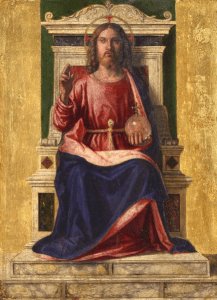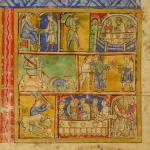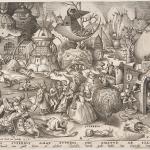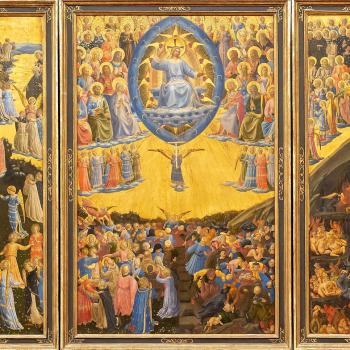
Christian Scripture warns us of the possibility of hell, that is, of eternal perdition, but it also tells us of the possibility of the restoration of all things as it says God is going to be all-in-all, and the final enemy will be overcome. Hans Urs von Balthasar, understanding both positions are indicated in Scripture, said it would be a mistake trying to create and assert as necessary any synthesis we make of those two possibilities because we do not have enough information to do so. We are left in a paradoxical situation, as Scripture gives to us two apparently contradictory outcomes to history. We can try to find some sort of resolution, and indeed, doing so is not a problem so long as we accept that our resolution is speculative and likely wrong. That way, we can accept that others have their own different speculations, speculations which are as faulty as our own, meaning, there is going to be no definitive, systematic presentation of what happens in the eschaton which answers all the questions we have today. We should be able to agree to disagree with each other so long as our speculations take in and accept all that is definitive, trying to find a way to have them work together, denying no dogmas of the Christian faith.
We will not know the eschatological fate of creation, and with it, the fate of everyone in creation, until the eschaton itself. This is why those who stand upon hope and hope that all will be saved, can have that hope, because they know we do not know if anyone actually will be damned. But it is important that they recognize it as hope, and not assert as a known fact no one will perish. To their merit, Scripture reveals to us such hope is what God desires, which is why it is easy to believe that the hope will be fulfilled, but again, it must remain hope, and not become presumption as Scripture still does warn us that many, if not most, could end up lost, that is, suffering eternal perdition.
The best way to take Scriptural discussions concerning the eschaton, especially as they often reflect two different outcomes, is to see that they conditional in nature; each represents what is possible if the right conditions are fulfilled. What we do not know, and what we will not know until the end of time, is the conditions which will be found in the eschaton, and therefore, the eschatological outcome for creation. We can speculate which we think will be had at the eschaton, and give reasons why we think they will be that way, but we must accept that such speculations rely upon many assumptions on our part, and no matter how good those assumptions are, we could be mistaken. We need to embrace humility in regards the eschaton, and indeed, it is such humility which will allow us to better understand what we are presented in Scripture. For then we can understand Scripture, both in regards the hope presented in it, and also the warnings given in it, are given to us in such a way to encourage us to act in such a way to fulfill the conditions needed for the hope that all might be saved can and will be fulfilled. This is why Jesus telling us he gave us the sign of Jonah is important, because Jonah warned Nineveh of their destruction, only to find out his warning was conditional and Nineveh was not destroyed. Thus, Jesus gave us the hermeneutical lens we need to understand eschatological statements in Scripture, that is, it is, by giving us the sign of Jonah, he tells us that we must not take eschatological predictions as indicating what is necessary but rather what is possible, which is why we should not become like Jonah, confuse possibility with necessity, and become angry with God when we find out our assumptions were proven false.
For the hope that all might be saved to be a real possibility we must understand, with Pope St. Leo the Great, that the aim of the incarnation was universal, seeking to bring about that outcome with creation:
To no one among the infirm has that victory of the Cross been denied. No one is there to whom the prayer of Christ will not be an aid. If it benefited many who were raging against him, how much more would it help those who turn to him? Ignorance is taken away, difficulties are smoothed over, and the sacred blood of Christ extinguished that fiery weapon by which the boundaries of life had been confined. Darkness of the ancient night has yielded to true light. [1]
No one is outside of Christ’s victory, the victory of life over death. The darkness of death, with the hate which fuels it, is overcome by the light of love. There is no one, not even Judas, who is left behind. To say Judas must be lost is to say there is a limit to God’s love, and therefore, there is a limit and condition to God’s love. God would no longer be God, in such a situation, as God’s love would not be who God is but a conditional activity of God. We must understand that God did not make Judas so that he would be lost, but rather, like everyone else, Judas was and is called to participate in the divine life. Whether or not Judas will, we do not know; what we do know is that we can’t say for sure he will not, that he was predestined to perdition, for any such thought implies the work on the cross was limited, and God, likewise, is limited.
God created out of love so that love God’s divine love can be shared, not just with God, but with what God has created. God does not desire to condemn anyone, which again, Jesus shows us by the way of the cross. What God does is let people act in relation to that love, to choose whether or not they will accept it and integrate it into their lives. God warns us what could happen if we abandon divine life for eternity, but by giving such warnings, God is hoping no one will ignore love and so hopes all will finally accept it and integrate it into their lives:
My longing, he says, it not for the death of the lawless but their repentance, having created human nature not to punish them but to give them a share in life. The facts confirm the words: he did not inspire the prophets, send the apostles, give written laws, promise good things and threaten hell with the intention of punishing; instead, he allowed human beings to go in the direction they choose. He continues doing all this today in order to ensure avoidance of the threatened disasters.[2]
If we ignore the purpose of the prophets and their warnings, if we turn what is conditional into what is necessary, would there be any good reason for them to say what they said and to suffer, as many of them suffered? The point of their work was to expose to the world the darkness of sin, and the harm it causes, so that we can be led beyond sin, and therefore, led back to God and finally engage the divine life as we were meant to do. Now, to be sure, when we turn our back on love, and so sin, we weaken our will, we defile our being, that is, we corrupt ourselves in such a way, we end up incapable of returning to the state we were before we sinned. This is why we need grace; it can heal us, overcoming the corruption we have caused ourselves. Once we accept such grace, and so find ourselves strengthened by it, we can heed the warnings given to us and do what we need to do in order to make sure we do not suffer the fate of eternal perdition. If we see that can happen to us, we can see it can happen to everyone, which is why we can hope that no one ends up lost forever.
We can and should hope that God’s desire is fulfilled, that the work of the cross truly leaves no one infirm, so that the victory over sin and death is complete and hell is “empty.” For, as St. Hildegard pointed out, Jesus is the Good Samaritan who has come to raise all of us out of the pit of hell:
But the Samaritan raised him up. For the Samaritan is the Son of God, made incarnate in the shrine of the Holy Spirit, that is, in the immaculate Virgin, without any of the blindness of Adam, which human nature has as a result of sin. And He raised Adam and all his race from the pit of hell. [3]
The whole of humanity, joined together as one, in “Adam,” in “human nature,” is raised up by the work of Christ. No one is outside of that work. So long as we think or believe there are some, if not many, who are necessarily lost and will suffer eternal perdition, we have not yet understood the message of the Gospel. For the Gospel is meant to be good news, but how is it good news if we think it tells us that some, if not many, if not most, of humanity must end up in hell? We are certainly given a warning of that possibility, but the good news is that the possibility can be averted. Nonetheless, we are still given a warning that as long as grace is not accepted, as long as love is denied, those who deny such love will not be able to participate in the glory of the divine life, and if they do not participate in the divine life, all they will experience is an eternity deprived of that glory, the eternity of their own self-making, an eternity of the lost who know no love, and therefore, no real joy or happiness. But again, we do not know if that will end up being anyone. We know the warning is conditional. We must accept that and hope that like with Nineveh, in the end, the warning will be heeded and those who could have been lost will instead be saved with those who have already accepted God’s grace and love.
[1] St Leo the Great, Sermons. Trans. Jane Patricia Freeland CSJB and Agnes Josephine Conway SSJ (Washington, DC: CUA Press, 1996), 288-9 [Sermon 66].
[2] Theodoret of Cyrus, Commentaries on the Prophets. Volume Two: Commentary on the Prophet Ezekiel. Trans. Robert Charles Hill (Brookline, MA: Holy Cross Orthodox Press, 2006), 124.
[3] St. Hildegard of Bingen, “Letter 164r” in The Letters of Hildegard of Bingen. Volume II. Trans. Joseph L Baird and Radd K Ehrman (Oxford: Oxford University Press, 1998), 116,
Stay in touch! Like A Little Bit of Nothing on Facebook.
If you liked what you read, please consider sharing it with your friends and family!
N.B.: While I read comments to moderate them, I rarely respond to them. If I don’t respond to your comment directly, don’t assume I am unthankful for it. I appreciate it. But I want readers to feel free to ask questions, and hopefully, dialogue with each other. I have shared what I wanted to say, though some responses will get a brief reply by me, or, if I find it interesting and something I can engage fully, as the foundation for another post. I have had many posts inspired or improved upon thanks to my readers.












